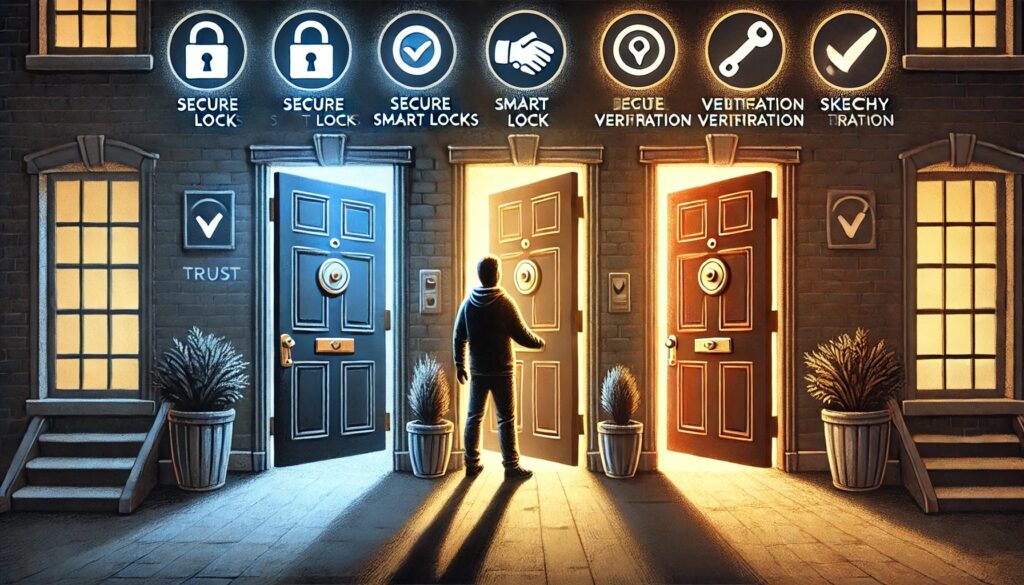Trust Is the Currency of the Rental Experience. So Why Aren’t We Valuing It?
For years, the rental industry has competed on square footage, amenities, and price. But today, in an era defined by digital-first leasing and self-guided tours, the most valuable currency isn’t a stainless-steel appliance or a fitness center—it’s trust.
Trust is what transforms a property tour from a nerve-wracking risk into an exciting opportunity. It’s what reassures a renter that they’re handing over their money and identity to the right person. And increasingly, it’s what sets the most successful operators apart in a crowded, competitive market.
The problem? Most of the industry still treats trust as a byproduct of the leasing process rather than a strategic asset.
The Trust Gap
The scale of the trust problem is hard to ignore. According to the 2024 Rently Rental Scams & Fraud Report, 93% of renters believe scams are common, and 90% worry about falling victim themselves. Nearly half of scam victims lose more than $1,000, and some lose upwards of $5,000—amounts that devastate households already stretched by housing costs.

It’s not just scams undermining confidence. The survey also found that 39% of renters distrust online rental platforms outright, with many placing the blame for fraud on platforms and landlords. Skepticism extends into technology itself: renters express concern about whether smart locks, cameras, and identity verification systems are truly secure.
This pervasive anxiety creates a climate where every listing can feel like a trap and every digital touchpoint a potential liability. For an industry betting its future on digital-first experiences, that’s a dangerous gap.
Why Tech Alone Isn’t Enough
The obvious response to renter fear has been “more tech.” Identity verification, pay-to-tour models, and app-driven scheduling all promise a safer, smoother process. But here’s the reality: providing access isn’t the same as earning trust.
As one industry expert put it in a recent conversation, property managers once relied on leasing agents and realtors as the human “trust facilitators” of the rental journey. In a self-guided world, that role now falls to digital systems. But systems alone can’t create trust. They can only enable it—if they’re backed by transparency, responsiveness, and care.
A delayed manager response, for example, doesn’t just frustrate renters; it opens a window for scammers to prey on them. A smart lock might wow on the first tour, but if a renter isn’t confident their data is safe, that technology becomes a liability, not an asset.
Technology is the infrastructure. Trust is the experience built on top of it.
What Trust Looks Like in Practice
So what does it mean to operationalize trust? It’s not an abstract ideal—it’s a set of tangible practices that make renters feel safe, respected, and in control.
Identity verification is one clear example. Renters want to know they’re dealing with a real property manager. Tools that verify both renter and manager identities cut off the most common scam pathways. As one expert explained, “If a renter stays in the ecosystem and doesn’t move off into private conversations, it’s very hard to get scammed.”
Pay-to-tour models and flexible scheduling give renters more control, reinforcing safety and autonomy in the process. Just as important, communication standards—especially speed—set the tone. Renters don’t just expect digital convenience; they expect timely, clear responses that confirm they’re on the right path. Increasingly, AI tools are helping property managers deliver on that expectation, answering common questions instantly and closing loopholes that scammers might otherwise exploit.
And trust extends beyond the tour itself. It’s visible in transparent maintenance processes, in clear expectations about pricing, and in reliable information about the community a renter is moving into. Even something as simple as promising a 24-hour repair window signals reliability. The small details accumulate into a bigger impression: this property manager is professional, organized, and trustworthy.
How Operators Can Lead
For property managers and platforms, the path forward is to treat trust as a strategic advantage, not an afterthought. Building trust isn’t only about protecting renters from fraud; it’s about shaping the overall experience in ways that make people feel safe, respected, and valued. Operators who prioritize transparency and responsiveness not only differentiate themselves in a crowded market but also create long-term loyalty that translates directly into lower vacancy and stronger reputations.
There are several concrete steps managers and platforms can take to put trust at the center of their business:
- Prioritize communication. Quick, honest interactions build confidence and prevent fraud, while long delays do the opposite. AI tools can help ensure renters always get timely, accurate information.
- Measure renter satisfaction. Surveys and feedback loops turn trust into data that managers can track, analyze, and improve. High levels of trust lead directly to faster leasing and fewer turnovers.
- Leverage technology thoughtfully. Tech isn’t a replacement for human interaction but an amplifier of it. Tools that validate pricing, verify identities, and detect scams show renters that managers are serious about their safety.
- Educate renters. Renters overwhelmingly want more resources to help them avoid scams. By offering guides, alerts, and tutorials, operators can reduce fraud risk while reinforcing their role as trusted partners.
The Shift We Need
The rental experience is at a crossroads. Operators can continue to treat trust as incidental—a nice-to-have that happens when everything goes smoothly. Or they can recognize it for what it is: a measurable, monetizable asset that underpins the entire industry.
Renters aren’t just choosing homes; they’re choosing whether to believe in the platforms and managers they interact with. And as scams proliferate and digital-first leasing becomes the norm, that belief has never been harder to earn—or more essential to keep.
Trust is no longer the byproduct of a good rental experience. It is the rental experience. The companies that understand this, invest in it, and operationalize it will not only protect their renters—they’ll secure their own long-term competitiveness.
Image generator: DALL-E
Prompt: the entire text of this article


Sorry, the comment form is closed at this time.